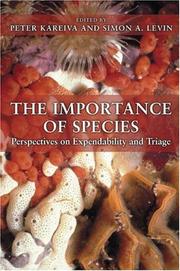| Listing 1 - 2 of 2 |
Sort by
|
Book
ISBN: 0199589003 1283264935 9786613264930 0191621420 9780191621420 6613264938 9780199588992 0199588996 9780199589005 9781283264938 9780191621031 019162103X Year: 2011 Publisher: Oxford [England] New York Oxford University Press
Abstract | Keywords | Export | Availability | Bookmark
 Loading...
Loading...Choose an application
- Reference Manager
- EndNote
- RefWorks (Direct export to RefWorks)
In 2005, The Millennium Ecosystem Assessment (MA) provided the first global assessment of the world's ecosystems and ecosystem services. It concluded that recent trends in ecosystem change threatened human wellbeing due to declining ecosystem services. This bleak prophecy has galvanized conservation organizations, ecologists, and economists to work toward rigorous valuations of ecosystem services at a spatial scale and with a resolution that can inform public policy. The editors have assembled the world's leading scientists in the fields of conservation, policy analysis, and resource economics
Ecosystem services. --- Human ecology. --- Ecosystem management. --- Biodiversity conservation. --- Environmental policy.

ISBN: 0691090041 069109005X 1400866774 132257216X 9781400866779 9780691090047 9780691090054 Year: 2003 Publisher: Princeton
Abstract | Keywords | Export | Availability | Bookmark
 Loading...
Loading...Choose an application
- Reference Manager
- EndNote
- RefWorks (Direct export to RefWorks)
A great many species are threatened by the expanding human population. Though the public generally favors environmental protection, conservation does not come without sacrifice and cost. Many decision makers wonder if every species is worth the trouble. Of what consequence would the extinction of, say, spotted owls or snail darters be? Are some species expendable? Given the reality of limited money for conservation efforts, there is a compelling need for scientists to help conservation practitioners set priorities and identify species most in need of urgent attention. Ecology should be capable of providing guidance that goes beyond the obvious impulse to protect economically valuable species (salmon) or aesthetically appealing ones (snow leopards). Although some recent books have considered the ecosystem services provided by biodiversity as an aggregate property, this is the first to focus on the value of particular species. It provides the scientific approaches and analyses available for asking what we can expect from losing (or gaining) species. The contributors are outstanding ecologists, theoreticians, and evolutionary biologists who gathered for a symposium honoring Robert T. Paine, the community ecologist who experimentally demonstrated that a single predator species can act as a keystone species whose removal dramatically alters entire ecosystem communities. They build on Paine's work here by exploring whether we can identify species that play key roles in ecosystems before they are lost forever. These are some of our finest ecologists asking some of our hardest questions. They are, in addition to the editors, S.E.B. Abella, G. C. Chang, D. Doak, A. L. Downing, W. T. Edmondson, A. S. Flecker, M. J. Ford, C.D.G. Harley, E. G. Leigh Jr., S. Lubetkin, S. M. Louda, M. Marvier, P. McElhany, B. A. Menge, W. F. Morris, S. Naeem, S. R. Palumbi, A. G. Power, T. A. Rand, R. B. Root, M. Ruckelshaus, J. Ruesink, D. E. Schindler, T. W. Schoener, D. Simberloff, D. A. Spiller, M. J. Wonham, and J. T. Wootton.
575.858 --- Species. Speciation --- 575.858 Species. Speciation --- Conservation biology. --- Species diversity. --- Endangered species. --- Biodiversity conservation. --- Biodiversity --- Biological diversity conservation --- Conservation of biodiversity --- Diversity conservation, Biological --- Gender mainstreaming in biodiversity conservation --- Maintenance of biological diversity --- Preservation of biological diversity --- Endangered animal species --- Endangered animals --- Endangered wildlife --- Threatened animal species --- Threatened animals --- Threatened species --- Threatened wildlife --- Vanishing species --- Vanishing wildlife --- Wildlife, Endangered --- Wildlife, Threatened --- Wildlife, Vanishing --- Diversity, Species --- Richness, Species --- Species richness --- Conservation --- Biodiversity conservation --- Endangered species --- Species diversity --- Conservation biology --- Ecology --- Nature conservation --- Species --- Wildlife conservation --- Rare animals --- Conservation of natural resources --- Ecosystem management
| Listing 1 - 2 of 2 |
Sort by
|

 Search
Search Feedback
Feedback About UniCat
About UniCat  Help
Help News
News